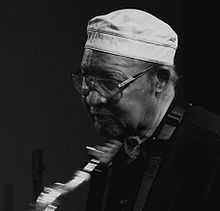Fred Anderson (musician)
| Fred Anderson | |
|---|---|
 Fred Anderson in 2005; Photo by Seth Tisue | |
| Background information | |
| Born | March 22, 1929 |
| Origin | Monroe, Louisiana, U.S. |
| Died | June 24, 2010 (aged 81) |
| Genres | Jazz |
| Occupations | Musician |
| Instruments | Saxophone |
Fred Anderson (March 22, 1929 – June 24, 2010) was an American jazz tenor saxophonist who was based in Chicago, Illinois. With a distinctive forward-bent playing posture, Anderson's playing was rooted in the swing music and hard bop idioms, but also incorporated innovations from free jazz, rendering him, as critics Ron Wynn and Joslyn Layne[1] have written, "a seminal figure among Chicago musicians in the '60s."
Biography
Anderson was born Monroe, Louisiana. He grew up in the Southern United States and learned to play the saxophone by himself when he was a teenager.[2] Anderson moved his family to Evanston, Illinois in the 1940s. He studied music formally at the Roy Knapp Conservatory in Chicago, and had a private teacher for a short time.[2] Fred worked installing carpet for decades to sustain his music and his family, before opening up a succession of important Chicago nightclubs. Despite Anderson's prominence as an avant-garde musician, his guiding inspiration was Charlie Parker, portraits of whom are prominently displayed at Anderson's club, the Velvet Lounge.
He was one of the founders of the Association for the Advancement of Creative Musicians (AACM) and an important member of the musical collective. His partner for many years was the Chicago jazz trumpeter Billy Brimfield.
Anderson appeared on several notable avant garde albums in the 1960s, notably the seminal Delmark recordings of saxophonist Joseph Jarman, As If It Were The Seasons (1968), and Song For (1966), which includes Anderson's composition "Little Fox Run."
In 1983, Fred Anderson took over ownership of the Velvet Lounge in Chicago, which quickly became a center for the city's jazz and experimental music scenes. The club expanded and relocated in the summer of 2006. Before that, his eclectic Beehive bar in west Chicago was a draw where musicians from around the world drank beer and played, mostly for each other.
Though he remained an active performer, Anderson recorded rarely for about a decade beginning in the mid-1980s. By the 1990s, however, he resumed a more active recording schedule, both as a solo artist, and in collaboration with younger performers, notably drummer Hamid Drake.
Anderson acted as mentor to young musicians who have gone on to prominent careers in music, either by featuring them in his groups or as performers at the Velvet Lounge. The list of musicians who he helped bring to public attention includes Drake, Harrison Bankhead, David Boykin, Nicole Mitchell, Justin Dillard, Aaron Getsug, Josh Abrams, Fred Jackson, Jr., George Lewis, Karl E. H. Seigfried, Isaiah Sharkey, and Isaiah Spencer. His son, Eugene Anderson, is a drummer.
Discography
As leader
- Another Place (Moers, 1978)
- Dark Day + Live in Verona 1979 (Atavistic, 1979) with Billy Brimfield, Steven Palmore, Hamid Drake
- Dark Day Live at the Museum of Contemporary Art Chicago 1979 (Message, 1979) with Billy Brimfield, Steven Palmore, Hamid Drake
- The Missing Link (Nessa, 1979, issued 1984) with Larry Hayrod, Hamid Drake
- Vintage Duets: Chicago, January 11, 1980 (Okkadisk, 1994) Duo with Steve McCall (dr)
- The Milwaukee Tapes Vol. 1 (Atavistic, 1980) with Billy Brimfield, Larry Hayrod, Hamid Drake
- Black Horn Long Gone (Southport, 1993, issued 2009) with Malachi Favors Maghostut, Ajaramu (AJ Shelton)
- Birdhouse (Okkadisk, 1995) with Jim Baker, Harrison Bankhead, Hamid Drake, and Marilyn Crispell (one track only)
- Fred Anderson/DKV Trio (Okkadisk, 1997) with Ken Vandermark, Kent Kessler, Hamid Drake
- Fred: Chicago Chamber Music (Southport, 1997) with Tatsu Aoki, Afifi Phillard
- Live at the Velvet Lounge (Okkadisk, 1998) with Peter Kowald, Hamid Drake
- 2 Days in April (Eremite, 1999) - with Hamid Drake, Kidd Jordan and William Parker
- Fred Anderson Quartet, Volume One (Asian Improv Records, 1999)
- Fred Anderson Quartet, Volume Two (Asian Improv Records, 2000)
- On the Run, Live at the Velvet Lounge (Delmark, 2000) with Tatsu Aoki, Hamid Drake
- Duets 2001: Live at the Empty Bottle (Thrill Jockey, 2001) Duo with Robert Barry (dr)
- Back at the Velvet Lounge (Delmark, 2002) with Maurice Brown, Jeff Parker, Harrison Bankhead, Tatsu Aoki, Chad Taylor
- The Great Vision Concert (Ayler, 2003)
- Back Together Again (Thrill Jockey, 2004) Duo with Hamid Drake (dr)
- Blue Winter (Eremite, 2004) with William Parker, Hamid Drake
- Timeless (Delmark, 2005)
- From The River To The Ocean (Thrill Jockey, 2007) Duo with Hamid Drake (dr)
- Fred Anderson Quartet, Volume Three (Asian Improv Records, 2008)
- Staying in the Game (Engine Studios, 2009) with Harrison Bankhead, Tim Daisy
- 21st Century Chase: 80th Birthday Bash, Live at the Velvet Lounge (Delmark, 2009) with Kidd Jordan, Harrison Bankhead, Jeff Parker, Chad Taylor
As sideman
With Joseph Jarman
- Song for (Delmark, 1966)
With Marilyn Crispell and Hamid Drake
- Destiny (Okkadisk, 1994)
References
- ↑ Ron Wynn & Joslyn Layne, "Fred Anderson".
- ↑ 2.0 2.1 Fred Anderson Biography Musician Guide
External links
| Wikimedia Commons has media related to Fred Anderson. |
|